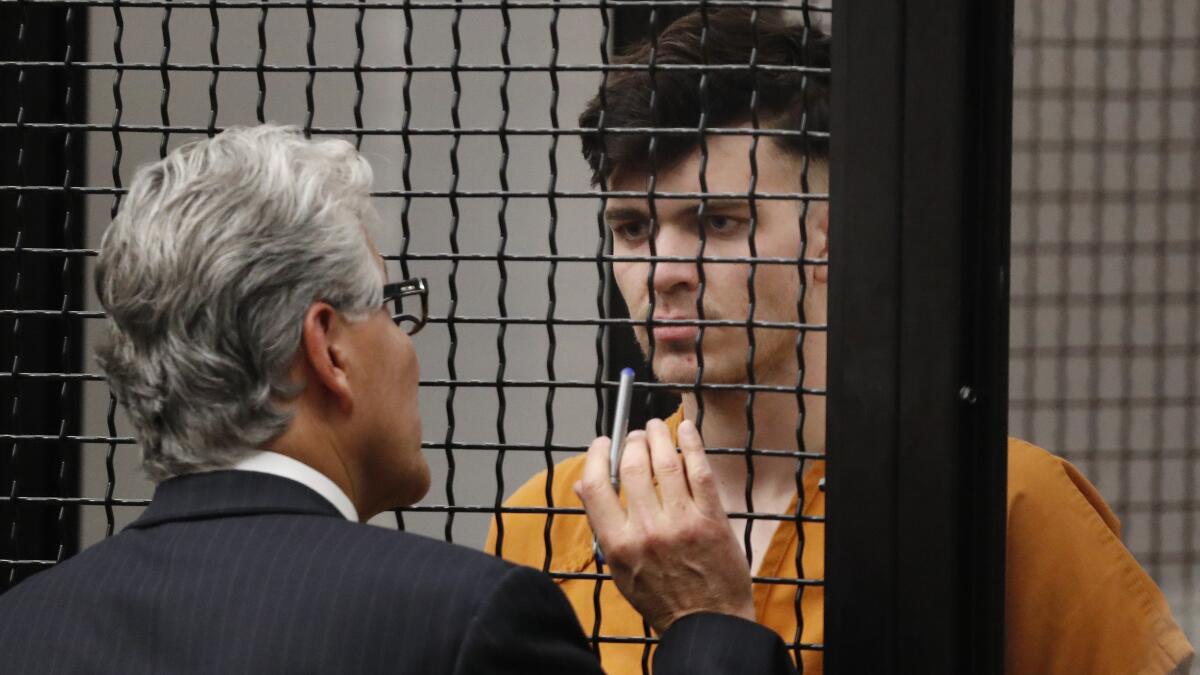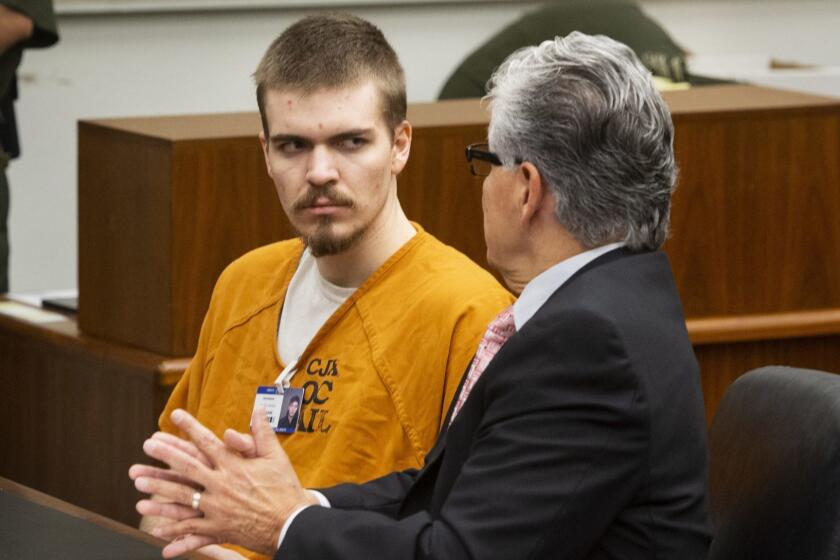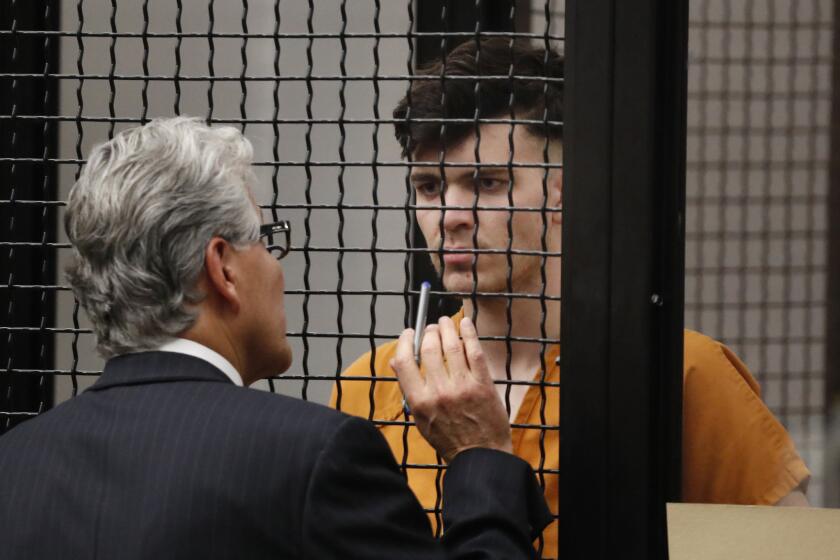As trial begins, O.C. prosecutors will try to prove Blaze Bernstein’s killing was a hate crime

Blaze Bernstein had been missing a week when investigators found his body buried under a thin layer of mud at Borrego Park in Lake Forest in January 2018, with 19 stab wounds to his neck.
A 19-year-old student at the University of Pennsylvania, where he was the managing editor of Penn Appetit, a student-run food magazine, he had come home to spend the holidays with his family in Orange County.
Suspicion soon fell on 20-year-old Samuel Woodward, Bernstein’s former schoolmate at the Orange County School of the Arts, who had admitted to being with him in the park the night he disappeared. Investigators said they found Bernstein’s blood on a visor in Woodward’s car, and on a knife discovered in a drawer at the Newport Beach home where Woodward lived with his parents.
A Newport Beach man charged in the stabbing death of his former high school classmate denied a sentencing enhancement allegation of a hate crime during a brief appearance Wednesday in Orange County Superior Court.
Bernstein was Jewish and gay, while Woodward, according to one of his attorneys, was conflicted about his sexuality. When investigators managed to hack into Woodward’s iPhone, they unearthed a trove of anti-gay, anti-Jewish material linked to the Atomwaffen Division, a white supremacist hate group.
The role that ideology may have played in Bernstein’s death will be sharply contested at his trial, with opening statements expected to begin Tuesday in Orange County Superior Court. Woodward is charged with murder, with enhancements for use of a deadly weapon and for hate crime, which could put him in prison for life without parole.
“There is this narrative that’s been pushed: Nazi kills gay Jew. From the defense perspective, that’s inaccurate,” Assistant Public Defender Kenneth Morrison told Judge Kimberly Menninger during one of many hearings leading up to the trial.
The exact defense strategy remains unclear, but one of Morrison’s aims will be to decouple his client’s alleged crimes from his client’s association with the Atomwaffen Division. The attorney has argued, with little success, to have references to Adolf Hitler and Nazis excluded from testimony on the basis that they are inflammatory.
They both went to high school at the elite Orange County School of the Arts, but the classmates weren’t particularly close.
The case has drawn widespread media interest, and Morrison objected to the possibility of video cameras in the courtroom, which “really could be traumatizing” to some of the 56 people on his witness list, some of whom are reluctant to testify.
“Is it simply because the news media loves the salacious narrative that they created?” Morrison said, adding that in a fraught political climate, publicity poses a “greater risk of prejudice for Mr. Woodward.”
Menninger, the judge, said the trial involves “great issues of public interest,” including “murder, sexual orientation, gender and religion.” She said she would allow cameras on a limited basis, in part because transparency would serve the safety of the courthouse.
“I need to be sure people trust us,” Menninger said. “I need them to see that we are not hiding the ball.”
According to testimony at a preliminary hearing in September 2018, the Orange County Sheriff’s Department worked diligently to crack open the contents of Woodward’s iPhone. An investigator carried the phone by hand to New Jersey, where a telecommunications company called Cellebrite Inc. worked for 10 weeks to find the PIN code, bypassing the auto-shutdown function.
On Woodward’s phone, investigators found an abundance of Atomwaffen-related material, including a photo of Woodward with James Mason, the author of “Siege,” which a prosecutor described as “the Bible” of the hate group.
According to Sheriff’s Department testimony, the phone also contained emails Woodward wrote and sent to himself under the heading “Sam’s Diary.” One email from May 2017 said:
“I tell sodomites that I’m bi-curious, which makes them want to ‘convert’ me … Get them hooked by acting coy, maybe send them a pic or two, beat around the bush and pretend to tell them that I like them and then kabam, I either un-friend them or tell them they have been pranked, ha ha.”
In another, from July 2017, he wrote that he had downloaded the dating app Grindr and was amusing himself by threatening gay people.
“LMAO,” he wrote, according to testimony. “They think they are going to get hate crimed and it scares the s— out of them ... Priceless.”
According to investigators, Woodward acknowledged meeting Bernstein on the night he vanished but asserted that Bernstein walked alone into the park and left him waiting, unsure “if Blaze was pranking him.”
Woodward also said that Bernstein had made a pass at him, an investigator testified, but Woodward found homosexuality “gross.” Asked about “numerous cuts and scrapes” on his hands, Woodward said he got them in a fight club, according to testimony in the preliminary hearing.
Six years after the killing, jury selection began in late February. A courtroom outburst by Woodward forced the process to start over. Woodward’s prior attorney said his client had Asperger’s syndrome and was torn about his sexuality. The trial is expected to last through the end of June.
More to Read
Sign up for Essential California
The most important California stories and recommendations in your inbox every morning.
You may occasionally receive promotional content from the Los Angeles Times.












